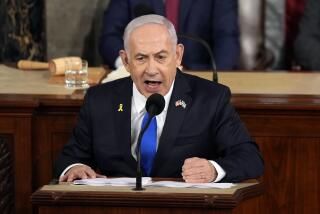Bush Clears Way for FSX Fighter Deal With Japan
- Share via
WASHINGTON — President Bush announced agreement Friday to proceed with a hotly debated deal with Japan to produce the FSX advanced fighter jet after he received assurances that U.S. jobs and technology would be protected.
After months of negotiations on a deal that at one point seemed in danger of being scrapped, Bush said the two nations finally “reached understandings that will allow us to proceed with joint development of the FSX fighter aircraft.”
During a brief appearance in the White House press room, the President also said the proposed arrangement would bolster the security of Japan and the United States without compromising U.S. technology.
‘Strategic Considerations’
“We weighed this matter from the standpoint of trade, of our industrial growth and technology transfer, as well as strategic and foreign policy considerations,” Bush told reporters.
Congress has 30 days to review the agreement, signed Friday by Secretary of State James A. Baker III and Japan’s Ambassador Nobuo Matsunaga. The House and Senate can reject it by a joint resolution of disapproval.
The plane, to be jointly produced by General Dynamics Corp. and Japan’s Mitsubishi Heavy Industries, is an advanced version of the U.S.-built F-16.
In addition to controls to safeguard sensitive computer technology, the Japanese government agreed to ensure that the United States have a 40% share of the FSX’s estimated $1.2 billion early development work. The full run is estimated to cost
Bush said that the United States would produce “a similar share” in the later production stages. Japan plans to build 130 of the planes for deployment in the late 1990s.
“There will be no cost to the American taxpayer and at the same time the Japanese will improve their ability to carry their share of the defense burden.
‘Strictly Controlled’
“I want to assure you that sensitive source codes for the aircraft’s computer will be strictly controlled,” Bush said, addressing a major concern of many on Capitol Hill. “Access will be granted to only those codes that are essential to complete the project.”
Administration officials, who spoke on condition of anonymity, said that codes for the new F-16 digital flight control computer, for instance, which just came out last year, will not be released to the Japanese. However, other software source codes needed for the FSX computer will be released.
Any new technology developed by the Japanese during the FSX program will be available to U.S. firms, but Japan will be banned from transferring to third countries or firms any technology derived from the U.S.-built F-16 plane, the officials added.
Because the FSX has a new generation of engines and avionics systems, safeguarding U.S. technology was a major sticking point in the deal.
A Defense Department official stressed that the United States would not provide Japan with highly sophisticated, top-secret software used in the most advanced F-16 jets. He also said the FSX would not be a better plane than American-built fighters.
“It’s not going to be superior, it’s going to be different,” he said.
Administration sources said the deal would be sent to Congress for review on Monday.
The Reagan Administration first negotiated the arrangement after Japan refused to buy any U.S. F-16 fighters and indicated it would build its own fighter plane.
Opposition Surfaced Immediately
Opposition to the plan surfaced almost instantly on Capitol Hill, where critics contend that the arrangement amounts to a giveaway of advanced technology that Japan may use to help propel the its civilian aircraft industry into head-to-head competition with the United States in the world market. They say Tokyo should purchase American-made planes to help offset the $50-billion U.S. trade deficit with Japan.
But supporters of the idea said the project is a way to add fighters to Japan’s inventory at Tokyo’s expense. It also would provide jobs for the United States, and give Washington access to sophisticated radar technology developed by Japan.
Negotiations reached an impasse last month when Japan and the United States failed to agree on the exact proportion of the work to be guaranteed to U.S.-based companies and on what kind of technology the two countries would share.
The United States demanded--and finally got--a Japanese commitment to allocate at least a 40% share of FSX production to American companies and workers and to clearly define the existing technology in the plane, so that the United States would be able to claim access to any advances that come out the joint project.
Reports from Tokyo earlier Friday said the agreement was near on the project as the Defense Agency decided to retract a demand that more than 50% of engine production work be given to Japan and that Japan receive all computer software for flight control of the U.S. F-16, which is the basis for the FSX jet.
More to Read
Inside the business of entertainment
The Wide Shot brings you news, analysis and insights on everything from streaming wars to production — and what it all means for the future.
You may occasionally receive promotional content from the Los Angeles Times.










